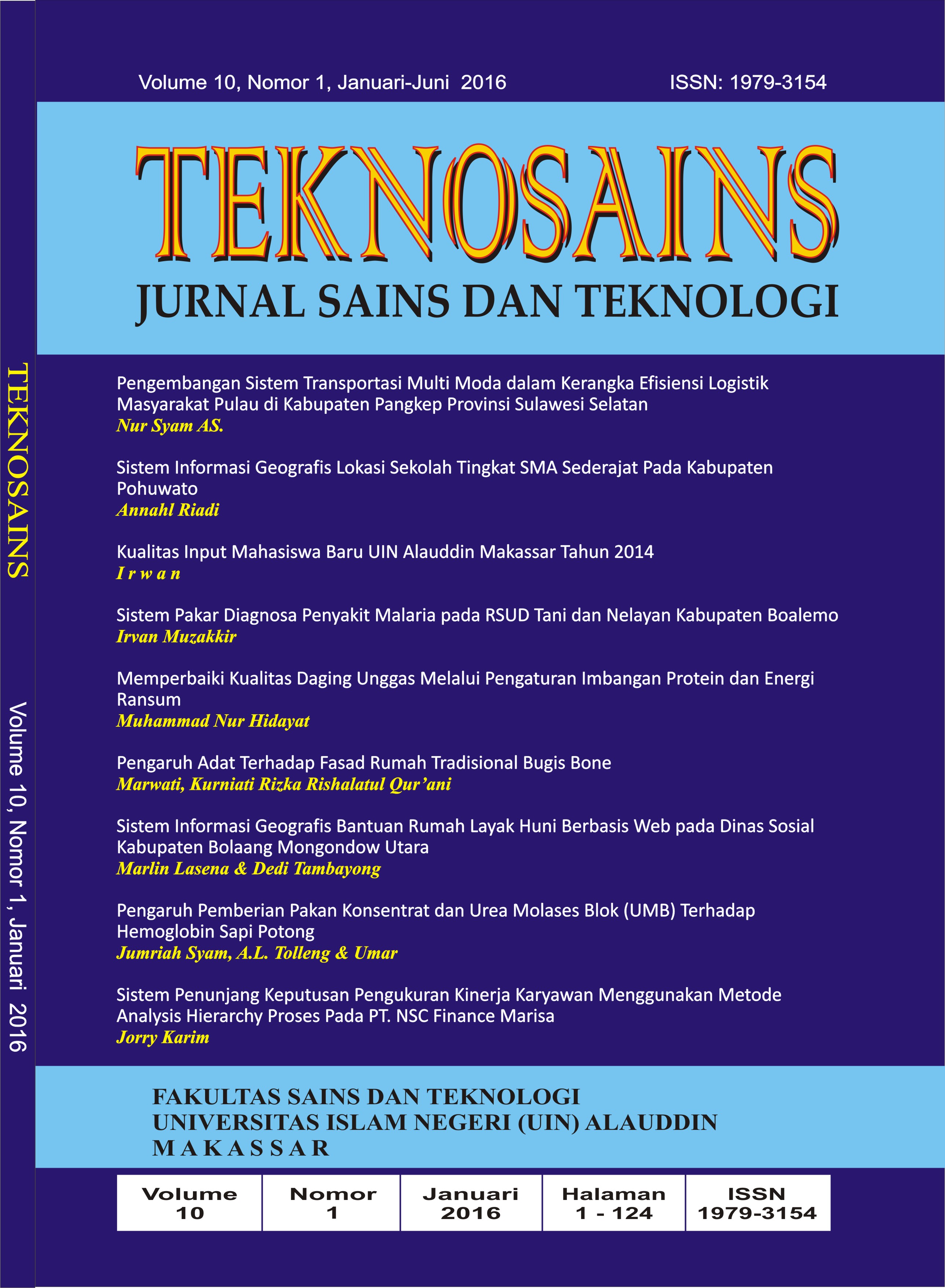PENGEMBANGAN SISTEM TRANSPORTASI MULTI MODA DALAM KERANGKA EFISIENSI LOGISTIK MASYARAKAT PULAU DI KABUPATEN PANGKEP PROVINSI SULAWESI SELATAN
Abstract
Based on the research results, it appears that the development ofmultimodal transportation system in Pangkep within the framework of
logistik efficiency island communities to do with optimizing the utilization of
large rivers that cross the territory Pangkep. The third river is the national
road network services, in addition is located adjacent to the vertices of the
other transport, such as road transport terminals, ports and railway station
plan. The river dock location that is on one site with markets and shops will
facilitate the transport of goods and facilitate the public to transact their
catch in the territorial waters of the island.
The development of multimodal transportation system in Pangkep is needed,
in addition to the potential that surrounded him, also have barriers and
problems faced by the island community. The high price of goods on the
island due to the lack mode of transport that can be used by local
communities in accordance with the movement of goods and capacity needs.
Volume logistik needs of the island community based food standards, thus
requiring facilities more adequate transport services through the provision
of specialized vessels, ie vessels with a capacity of 350 DWT. This ship is a
type of vessel that can be saved by the government as a ship pilot for remote
areas and islands (promote the trade ships and ships follow the trade). The
transport system development course provides broad direction of regional
development that can improve the welfare of the people in the island
territories Pangkep.
References
Adisasmita R, 2005, Dasar-dasar Ekonomi Transportasi, Makassar, Unhas
Adisasmita R, 2004, Pembangunan Perdesaan, Unhas, Makassar
Adisasmita R, 2004, Indikator Perkembangan Tata Ruang Wilayah (Konsep Dan Aplikasinya), Unhas, Makassar
Balitbang Kemhub, 2007, Studi Pengembangan Sistem Logistik Nasional, Final Report, Jakarta.
Ballau, Ronald H. 1973. Business Logistiks Management. Prentice-Hall Inc. New York.
Bappeda, Pangkajene, 2011, Rencana Tata Ruang Wilayah Kabupaten Pangkep
Bowersox, D.J., 2006, Manajemen Logistik Integrasi Sistem-Sistem Manajemen Distribusi Fisik dan Material, Edisi Terjemahan, Bumi Aksara, Jakarta
Bowersox, Donald J, 1978, Logistiks Management 2, Second Edition, Terjemahan oleh Hasyim Ali, Bumi Aksara, Jakarta.
Haming M., 2007, Manajemen Produksi Modern, Operasi Manufaktur dan Jasa, Bumi Aksara, Jakarta.
Hobbs F.D., 1995, Perencanaan dan Teknik Lalulintas, Edisi kedua, Gadjah Mada University Press, Yogyakarta.
Indrajit, E.R., 2006, Konsep Manajemen Supply Chain, Cara Baru Memandang Mata Rantai Penyedia Barang, Grasindo, Jakarta
Indrajit, RE,. dan Djokopranoto, R. 2003. Manajemen Persediaan. Grasindo, Jakarta
Jinca, MY. 2000. Perencanaan Transportasi, Modul Perkuliahan PPS-Unhas. Makassar.
Jinca, M.Y., 2008, Antisipasi Perkembangan Teknologi Petikemas Terhadap Prasarana dan Sarana Transportasi Multimoda, Publikasi FSTPT, UGM Yogyakarta.
Morlok, Edward K., 1995, Pengantar Teknik dan Perencanaan Transportasi, McGraw Hill,Inc (terjemahan).
Said. A. Ilham, dkk. 2006. Produktifitas dan Efisien dengan Supply Chain Manajerial. PPM, Jakarta.
----------, 2008, Studi Pola Distribusi Sembilan Bahan Pokok dan Kebutuhan Sarana Angkutannya, Final Report, Jakarta.
This license allows authors to copy, redistribute, remix, transform, and build upon the Work, in any format or medium, for any purpose including commercial purpose, on a perpetual basis provided they credit the Work and the authors. Authors
must explain any changes that were made from the original and may not suggest the authors endorse the use. The resultant work must be made available under the same terms, and must include a link to the CC BY 4.0 International License.


 This work is licensed under a
This work is licensed under a 